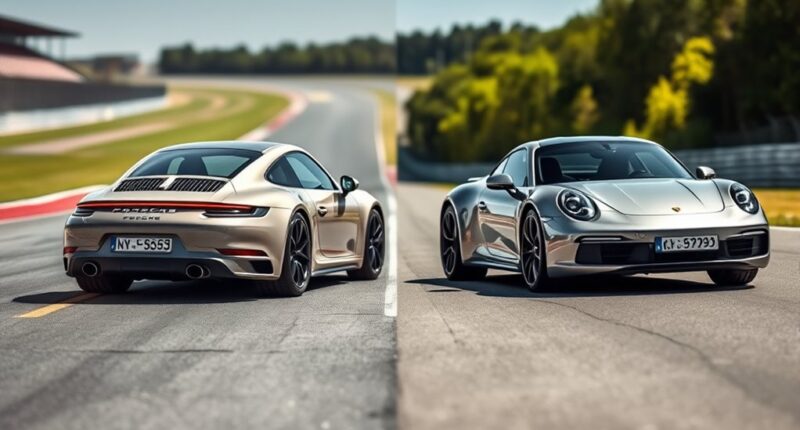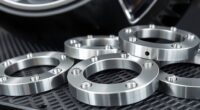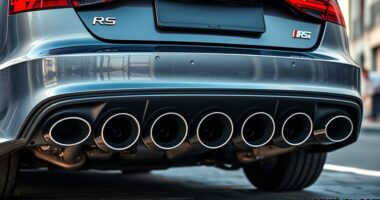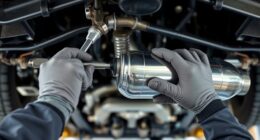If you’re choosing between Porsche 911 turbocharged and naturally aspirated models, you’ll notice that turbo versions deliver more power and torque, especially at lower RPMs, making them great for high-speed stability and quick acceleration. Naturally aspirated engines provide a more immediate response and a richer exhaust sound, offering a pure driving experience. To understand how each engine type shapes performance and driving feel, keep exploring the details behind these powerful machines.
Key Takeaways
- Turbocharged Porsche 911s deliver more torque and sustained acceleration, ideal for high-speed and track performance.
- Naturally aspirated engines offer immediate throttle response and a high-revving, linear power delivery for an engaging driving experience.
- Turbo models produce a muted exhaust note, while naturally aspirated engines emit a distinctive, aggressive engine sound.
- Naturally aspirated engines are mechanically simpler and generally more reliable over the long term than turbocharged variants.
- The choice depends on preference for modern torque and efficiency versus pure, responsive driving dynamics.

When choosing between a turbocharged and a naturally aspirated Porsche 911, understanding their performance differences is essential. Turbocharged models pack a punch with forced induction, delivering impressive power and torque across a broad RPM range. They rely on electric motors in hybrid variants to enhance performance further, providing quick acceleration and improved fuel efficiency. In contrast, naturally aspirated engines generate power through atmospheric pressure, resulting in a more linear and predictable power delivery. You’ll notice that their response feels more immediate, which many driving enthusiasts prefer for the pure, unfiltered connection to the road.
Naturally aspirated Porsche 911s offer immediate response and a pure, linear power delivery for an authentic driving experience.
One of the most noticeable differences lies in the exhaust sound. Naturally aspirated engines produce a distinctive, often more aggressive tone—this authentic engine note is a hallmark of the traditional Porsche driving experience. The sound is rich and harmonic, resonating with the engine’s high-revving nature. Turbocharged engines, on the other hand, tend to produce a different exhaust note. While modern turbo engines are engineered to sound sporty, their exhaust note can feel less raw, sometimes muted by the turbo’s noise suppression technologies. However, with advancements in exhaust tuning and active sound design, some turbo models now emulate the auditory excitement of their naturally aspirated counterparts, though purists might still prefer the authentic roar of a naturally aspirated Porsche 911.
Performance-wise, turbocharged models excel in high-speed stability and sustained acceleration, thanks to their increased torque at lower RPMs. This makes them particularly suited for highway cruising and track days. Naturally aspirated engines, however, shine in their responsiveness and high-revving character. They often reach higher RPMs before peak power, giving you a thrilling, visceral feeling when pushing the engine to its limits. The absence of a turbo means less lag and a more direct feel, which many drivers find more engaging.
In terms of maintenance and reliability, turbo engines can require more care due to their complex components, like intercoolers and high-pressure turbos. Naturally aspirated engines tend to be simpler and often more durable over time. Whether you prioritize the instant torque and modern tech of turbocharging or the purity and simplicity of naturally aspirated power, understanding these core differences helps you choose the Porsche 911 that best matches your driving style.
Frequently Asked Questions
How Does Turbocharging Affect Long-Term Engine Reliability?
Turbocharging can impact your engine’s long-term reliability by increasing engine wear due to higher pressures and temperatures. However, if you maintain proper lubrication and follow recommended service intervals, it can enhance lubrication longevity and reduce wear over time. Regular oil changes and quality lubrication help mitigate turbo-related stress, ensuring your engine stays dependable. With proper care, turbocharged engines can perform reliably for many miles without significant issues.
Which 911 Model Offers the Best Balance of Power and Efficiency?
This 911 model is a true masterpiece, balancing power and efficiency perfectly. You’ll love the Carrera S for its impressive driving dynamics and fuel economy, making it ideal for everyday use and spirited drives alike. It offers a dynamic blend of turbocharged performance with manageable fuel consumption, so you get exhilarating speed without sacrificing practicality. If you seek a versatile Porsche that excels in both power and efficiency, the Carrera S is your best choice.
Are There Significant Maintenance Cost Differences Between Turbo and NA Engines?
You’ll find that turbo engines generally have higher maintenance costs, especially for turbo maintenance and potential engine overhaul. They often require more frequent checks due to added components like turbochargers and intercoolers, which can increase wear and tear. Naturally aspirated engines tend to be simpler, meaning lower long-term costs. If you prioritize lower maintenance, a NA engine might be a better choice, but turbo engines offer more power at a premium.
How Do Turbocharged 911S Perform in Track Conditions Compared to NA Versions?
You’ll find turbocharged 911s excel on the track with quick acceleration, but turbo lag can momentarily delay response, especially at lower RPMs. They often produce a more aggressive exhaust note, adding excitement to your drive. Naturally aspirated models deliver more immediate throttle response and a purer engine feel, making them ideal for drivers seeking a direct, unfiltered connection. Ultimately, your choice depends on whether you prioritize instant response or boosted power.
What Are the Environmental Impacts of Turbocharged Versus Naturally Aspirated Engines?
You’ll find that turbocharged engines often produce higher emissions due to increased fuel combustion, making it harder to meet strict emissions standards. They tend to consume more fuel under load, impacting fuel consumption. Naturally aspirated engines typically have lower emissions and better fuel economy, but turbocharged ones can be optimized with newer technology to reduce environmental impact. Ultimately, your choice depends on balancing performance with environmental considerations.
Conclusion
Ultimately, choosing between turbocharging and naturally aspirated Porsche 911s is like selecting your own racing heartbeat. Turbocharged engines pulse with relentless energy, symbolizing raw power and modern innovation. Naturally aspirated engines flow smoothly, embodying timeless craftsmanship and purity. Whichever path you take, remember that each represents a different rhythm of performance—one roaring with modern fire, the other flowing with classic grace. Your drive becomes a symbol of your passion — fierce or refined.










